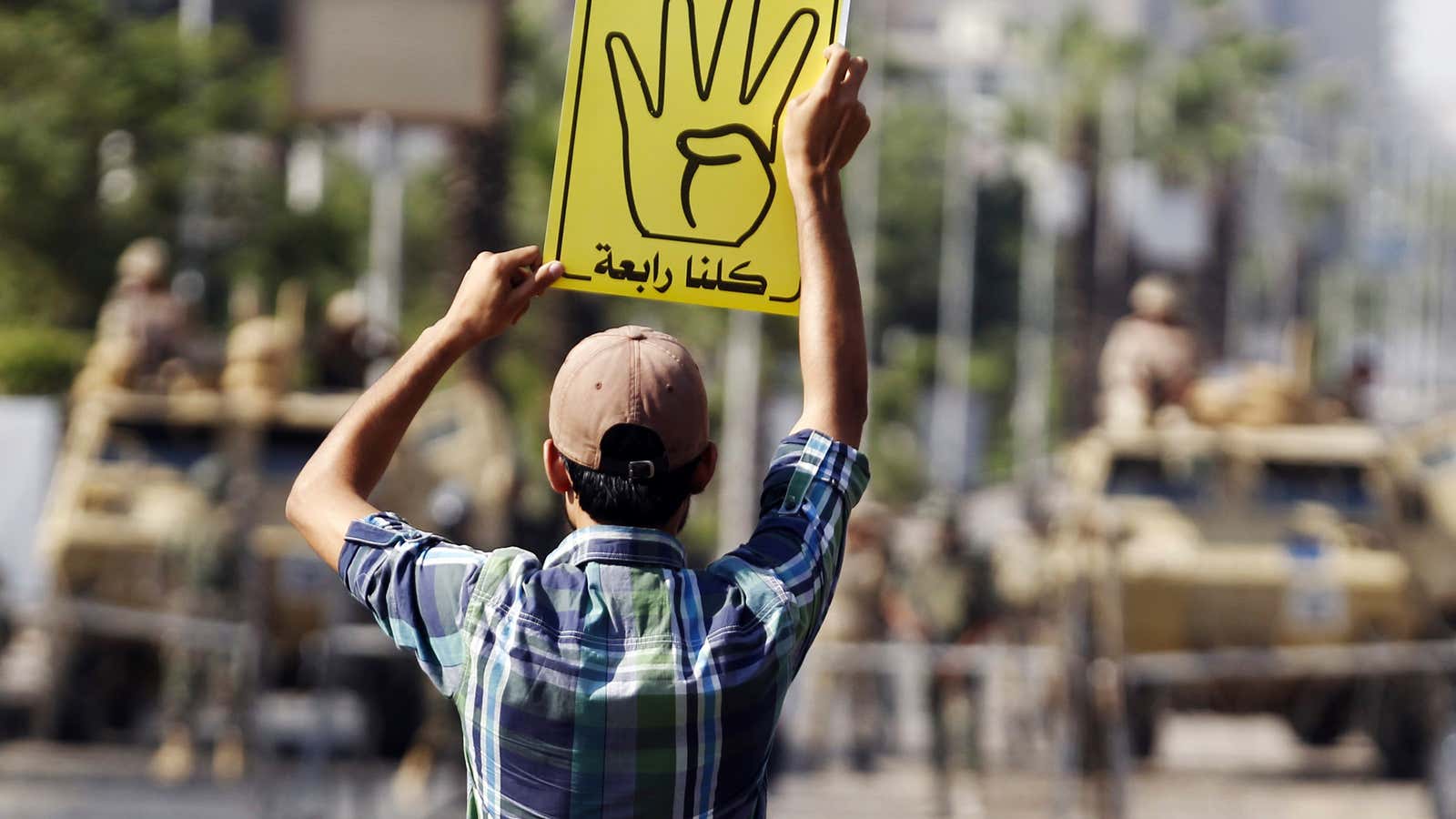The signs say it louder and clearer.
When protests take over cities or countries, the slogans and symbols create a visual narrative that serve as a reminder for the demands of protestors. From Hong Kong’s Umbrella Revolution to the ‘Hands Up, Don’t Shoot’ sign in the United States and the Sunflower Movement in Taiwan, demonstrators have always come up with ingenious ways to make their protests distinctive and memorable.
In Africa, many protest signs continue to come up as various marches and rallies take place across the continent. Here are some of them:
Crossing arms
Ethiopians have been using the crossed fist symbol to protest the government’s crackdown on Oromo and Amhara demonstrators. Around 500 people have been killed since the anti-government marches started in the country last November, according to human rights organizations. However, the gesture burst into global prominence on the last day of the 2016 Rio Olympics, when marathoner Feyisa Lilesa crossed his arms in X before he crossed the finish line to win a silver medal. Lilesa also crossed his hand again during the flower ceremony held after the run. Lilesa, an ethnic Oromo himself, said he was standing with his people who were demanding equal rights and full political participation.
The sign was also recently seen during protests in a South African school, when black girls were banned from wearing their natural hairdos.
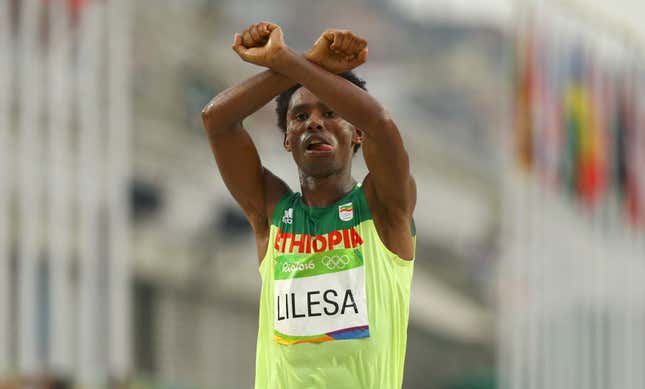
Shaving hair:
If hair is political in South Africa, it has also taken a new political significance in Ethiopia. The country’s citizens have been shaving their heads to show solidarity with political prisoners. The wave of shaving caught on in response to a letter smuggled out of prison and attributed to Oromo political leader and educator, Bekele Gerba. Gerba, a leader of the Oromo Federalist Congress, was arrested last year and charged under Ethiopia’s anti-terrorism law. His letter called for a three-day national mourning to commemorate those killed by the government during the Oromo and Amhara protests. Shaving hair is considered a cultural norm in Ethiopia following the death of a family member or a loved one.
The Rabaa symbol:
The Rabaa al-Adawiya Square in Cairo was the sight of one of Egypt’s bloodiest moments in recent history. Supporters of former president Mohamed Morsi camped at the square after he was deposed by the military after a year in office. After weeks of demonstrations, the military violently dispersed the protests, killing over 800 people according to one estimate. Since then, the Rabaa symbol, showing four fingers on yellow posters, has featured in anti-government protests. Besides alluding to the Rabaa square, ‘Rabaa’ also means ‘four’ in Arabic. Last year, the Egyptian government renamed the square after the country’s assassinated prosecutor general, Hisham Barakat.
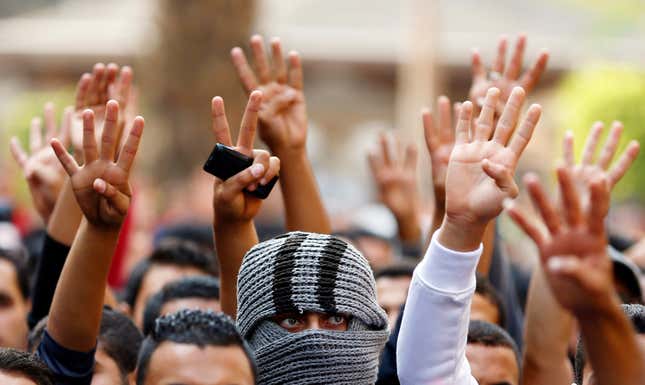
Undressing to redress:
Women from all echelons of African societies have undressed in the past to draw attention to how they face discrimination and marginalization. Dr. Stella Nyanzi, an academic at Makerere University, undressed earlier this year to protest a dispute with the institute’s director over her contractual agreements. Nyanzi posted the naked photos and a video on Facebook after she was locked out of her office. She was later allowed back into her office.
Ugandan women also stripped in front of government officials last year, accusing them of wanting to take their land. In Uganda, a woman stripping is considered an ill omen, and is seen as a way to invoke curses on your enemy.
Pitching the poo:
Protestors at the University of Cape Town in South Africa threw human excrement at the statue of Cecil John Rhodes, a colonial politician and businessman. Students at the university demanded the removal of the statue, saying the statue represented a symbol of oppression, and hindered the move for change and progress in the country. The statue, which was positioned at the university’s campus since 1934, was finally removed last year.
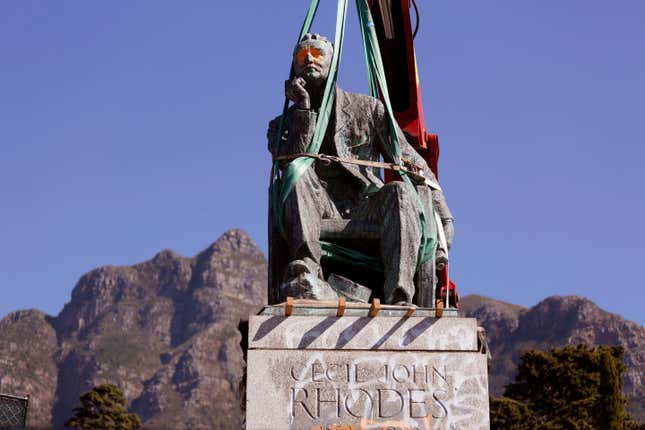
Clenching fists:
This one is definitely not an Africa-specific symbol of protest. It’s the penultimate iconography for struggle and resistance, and has been used by protestors of all political leanings and for all sorts of causes. Yet, the clenched fist of Nelson Mandela, holding hands with his then-wife Winnie, walking out of prison after 27 years, was marked as a sign of triumph against the apartheid regime in South Africa.
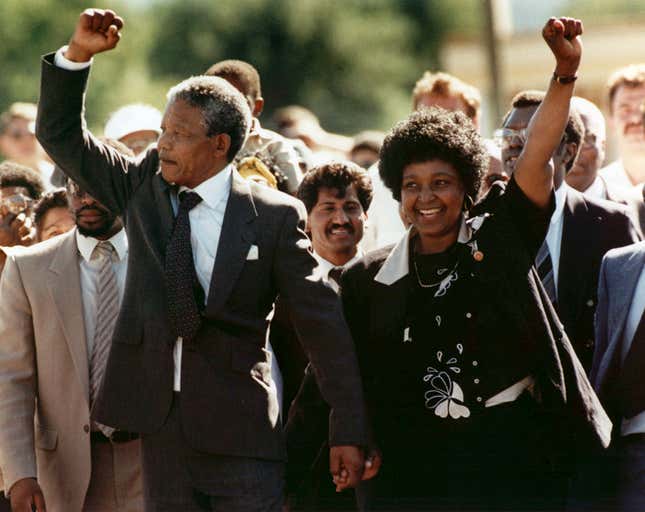
Hash tag activism:
Internet and technology skeptics have often said that the revolution will not be tweeted. But examples of these are now prevalent in Africa, as smartphone use increases and more people get connected online. To that end, we have witnessed new forms of hash tag activism, with netizens demanding the removal of colonial statues, reduction in university fees, an end to human rights abuses, to oppression and to dictatorship.
